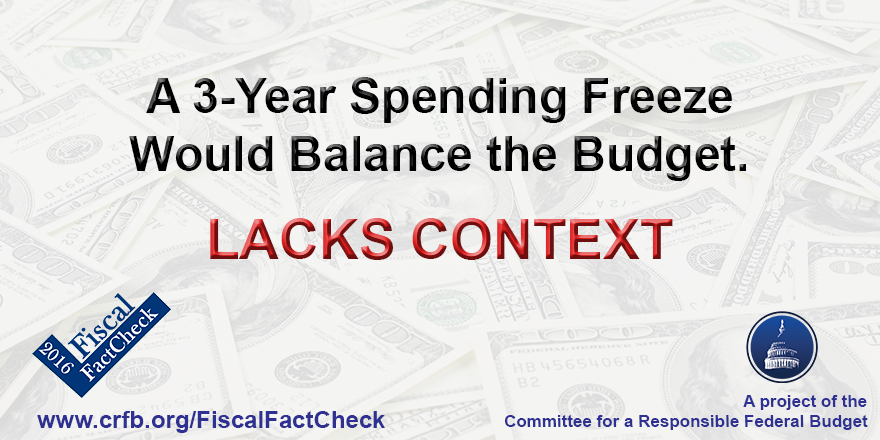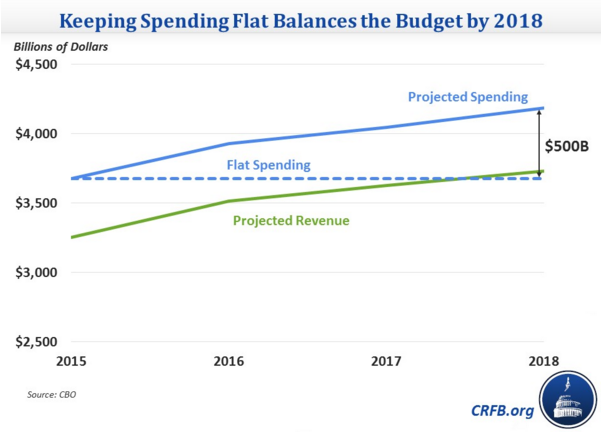Would a 3-Year Spending Freeze Balance the Budget?
Republican Presidential candidate Ben Carson has frequently talked about constraining the growing national debt, and this summer said that "you could balance the budget by just not spending one penny more than we do today each year for the next three years. No cuts, just no growth for three years. Surely, serious adults could agree on that." This claim is technically correct, but unrealistic as it lacks context of what it would actually take to freeze all spending.

According to CBO, the federal government spent $3.68 trillion in FY 2015, which would be $50 billion lower than the $3.73 trillion of projected revenue in 2018. Yet freezing total spending is not as easy as Carson suggests. It would mean allowing spending to erode relative to inflation, population growth, GDP growth, and other pressures. In fact, relative to projected spending, it would represent a $500 billion spending cut in 2018 alone – a 12 percent cut to total spending and 13 percent to non-interest spending.

When you investigate different areas of the budget, it quickly becomes clear why achieving a spending freeze is so difficult:
- Interest Spending (9 percent of the 2018 budget): Under CBO's baseline, interest spending is projected to grow by $150 billion between 2015 and 2018. Most of this increase is due to rising interest rates, meaning that even if the debt did not grow over the next few years, interest payments would still rise significantly. Short of interest rates being much lower than expected or defaulting of the debt, there is no realistic way to freeze or even dramatically slow the growth of interest payments by 2018.
- Social Security (24 percent of the 2018 budget): Social Security spending is projected to grow by $130 billion over the next three years due to more people becoming eligible for the program and benefits growing over time to keep up with wage growth and inflation. Avoiding this increase altogether would require cutting all benefits by 12 percent, and it would be impossible to freeze spending if current beneficiaries were exempted from cuts. No Social Security plan past or present has proposed a cut of close to 12 percent for all beneficiaries that quickly.
- Medicare (14 percent of the 2018 budget): Spending on Medicare programs is expected to increase by $51 billion between now and 2018 as retiring baby boomers continue to enroll in Medicare and as health care costs increase.
- Defense Spending (14 percent of the 2018 budget): Under current law, defense spending is expected to grow by $17 billion over the next three years. However, many Republican candidates are proposing increasing defense spending, which would cause this figure to be even greater.
Outside of those major categories, the rest of the budget is projected to rise by $161 billion between 2015 and 2018, which is less than the combined growth of Medicare and Social Security. To freeze spending for the next three years without touching Social Security, Medicare, and defense would require a 34 percent cut to the rest of the 2015 budget. If lawmakers were able to cut the growth of Social Security, Medicare, and defense in half, the rest of the 2015 budget would still need to be cut by 28 percent.
Reductions of this magnitude would be near-impossible to achieve. And even if they were, it would be difficult to describe them as "just a freeze" and "no cuts" since they would require significant changes to a variety of government programs.
To sum up, Carson was correct in his claim that freezing total spending would balance the budget in three years. Freezing non-interest spending would also balance the budget in five years. Either way, though, freezing spending would require significantly changing program parameters – since many of them are growing as a result of inflation, demographics, or other factors – and likely require nominal dollar cuts in some areas of the budget.
While simply freezing spending sounds like an easy solution, it has not happened because it isn't easy. To sustain spending freezes over a multiyear period would require a significant downsizing of government.

